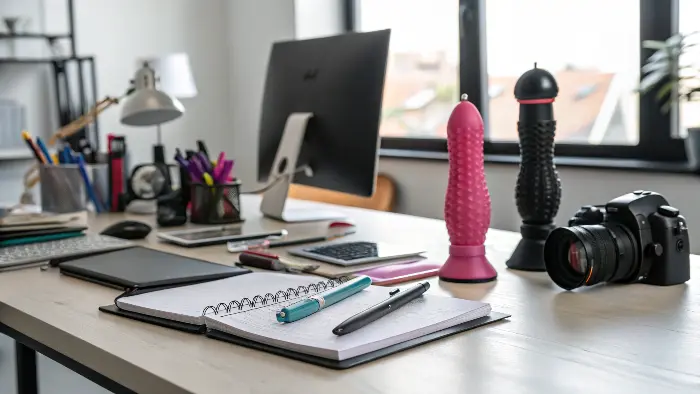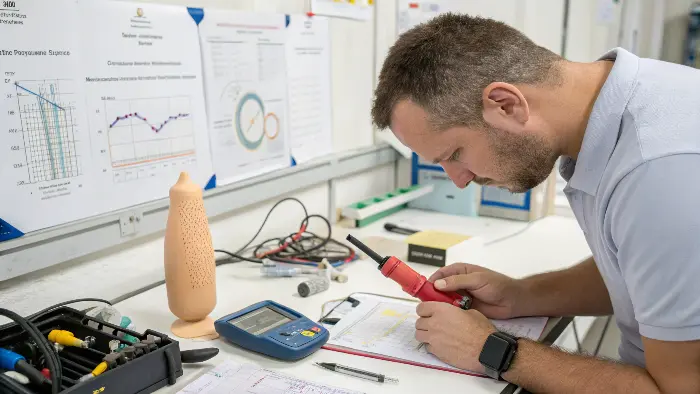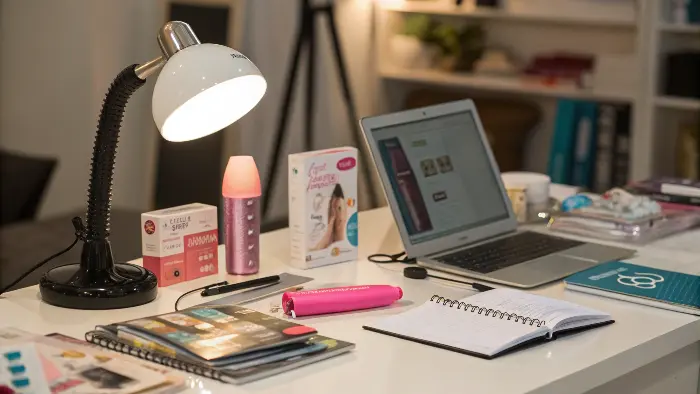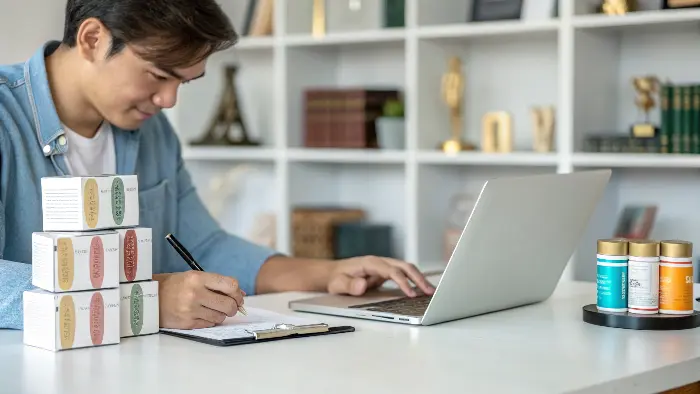The idea of being an adult toy tester sounds like a dream job to many. You imagine a world of pleasure and getting paid for it. But when you actually try to find these jobs, you hit a wall of silence, or worse, sketchy websites. It feels like a secret club with no clear way in.
Finding a job as an adult toy tester isn’t about searching on Indeed or LinkedIn. The path involves building a reputation as a detailed product reviewer, joining specialized market research panels, or networking directly with brands. These are almost always freelance or gig-based roles that require professionalism and the ability to provide objective, highly detailed feedback, rather than a full-time salaried position.

As someone who founded an adult product brand, I get asked about this all the time. People see the fun, but they don’t see the work that goes into it. The truth is, we rely heavily on good testers to perfect our products before they ever reach the market. The fantasy is one thing, but the reality of the job—and how we find the right people for it—is quite different. Let’s pull back the curtain on what this role really entails and how you can pursue it legitimately.
What does an adult toy tester actually do?
Many people think the job is simple: receive a product, use it, and give a quick thumbs-up or thumbs-down. They imagine it’s all about personal enjoyment. But from a brand’s perspective, that kind of feedback is almost useless. If a tester just tells me "it was great," my design team has nothing to work with. We need to know the why and the how to make real improvements.
An adult toy tester’s primary role is to provide structured, objective, and detailed feedback on a product’s performance. This involves following a specific testing protocol, meticulously documenting everything from ergonomics and noise levels to battery life and ease of cleaning. The job is less about personal pleasure and more about being a quality assurance analyst who can clearly communicate a product’s strengths and weaknesses in a written report.

The feedback we get from testers directly influences the final product that ends up on the shelf. A good tester is an essential part of my research and development process. They are our first real-world users, and their insights are invaluable. But to provide those insights, they have to go far beyond a simple opinion.
The Details We Need
When we send a product to a tester, it comes with a detailed set of instructions and a questionnaire. We aren’t just asking, "Did you like it?" We’re asking specific, technical questions. For example, we might ask a tester to run the toy on its highest setting and time how long the battery lasts, down to the minute. We’ll ask them to measure the noise level using a decibel meter app on their phone. We need them to describe the texture of the silicone, the responsiveness of the buttons, and whether the charging port is easy to access. This is data collection, not just a casual experience.
The Difference Between Subjective and Actionable Feedback
The most critical skill for a tester is the ability to be objective. Subjective feedback is based on personal preference, while objective, actionable feedback is based on facts and observations that our engineers can use. Saying "I didn’t like the color" isn’t helpful. Saying "The matte black finish shows fingerprints and dust very easily" is actionable feedback we can use to explore different material finishes.
| Useless Feedback | Helpful, Actionable Feedback |
|---|---|
| "It felt good." | "The vibration patterns are distinct, but the transition between them is too abrupt. The motor is quietest on settings 1-3 but has a noticeable high-pitched whine on setting 5." |
| "I didn’t like the shape." | "The curve of the head is well-designed, but the base is too narrow, making it difficult to grip securely, especially when using lubricant." |
| "The battery died fast." | "From a full charge, the battery lasted 55 minutes on the highest continuous setting. It took 2 hours and 15 minutes to fully recharge using the provided USB cable." |
This level of detail is what separates a hobbyist from a professional product tester.
What qualifications do you actually need to become a product tester?
There’s a common misconception that you need a special degree in sexology or engineering to be considered for a product testing role. This belief can be intimidating and stops many people from even trying. They assume brands like mine are only looking for academics or people with a long list of professional credentials. The reality is that the skills we value most are much more practical.
You do not need a formal degree to be an adult toy tester. The most important qualifications are excellent written communication skills, a keen eye for detail, and unwavering professionalism. We look for people who can articulate their experience clearly and objectively, follow complex instructions precisely, meet deadlines without fail, and maintain strict confidentiality. A genuine passion for product design is far more valuable than a specific diploma.

When I’m looking for new testers to join our panel, I’m not looking at their resume for a university name. I’m looking for evidence of the core skills that make a tester a valuable partner. These are skills anyone can develop, and they are the true qualifications for the job.
The Power of Clear Communication
This is the number one skill. Can you write a report that is clear, concise, and easy for my product team to understand? Your feedback is useless if we can’t make sense of it. This means using proper grammar and spelling and structuring your thoughts logically. You need to be able to describe sensations, functions, and flaws in a way that leaves no room for misinterpretation. It’s about being a good technical writer, translating your personal experience into a professional document.
Objectivity and Attention to Detail
I’ve mentioned this before, but it’s worth repeating. You must be able to separate "what I like" from "how it works." Your personal preferences are interesting, but they aren’t data. We need you to be a methodical analyst. Did you test every vibration pattern? Did you try cleaning the toy with different methods to see how the material holds up? Did you notice that a button is slightly harder to press with your left hand than your right? This meticulous attention to detail is what helps us find and fix small flaws before a product launch.
Professionalism and Discretion
This is non-negotiable. As a tester, you will be handling products that are not yet available to the public. You will be privy to our trade secrets. Because of this, every tester must sign a Non-Disclosure Agreement (NDA). Leaking a photo or details about an unreleased product is the fastest way to be permanently blacklisted from our panel and likely the entire industry. Professionalism also means being reliable. Our development schedules are tight. If you say you will submit a report by Friday, we need that report on Friday. Reliability and discretion are the foundations of trust.
Where can you find legitimate product testing opportunities?
If you’ve ever typed "sex toy tester jobs" into a search engine, you’ve probably been met with a wall of questionable websites. Many of them are scams designed to collect your personal data or even ask you to pay a fee to join a "panel." This can be incredibly frustrating and makes it seem like no real opportunities exist. They do exist, but they aren’t advertised like normal jobs.
Legitimate product testing opportunities are found through three primary channels: establishing yourself as a trusted online reviewer, signing up for professional market research panels, or engaging directly with brands. These paths require patience and effort, as you need to build credibility. Brands seek out reliable, articulate individuals and will not use public job boards to find them due to the sensitive nature of the work.

As a brand, we are very careful about who we bring into our testing process. We need people we can trust. That’s why we don’t just put an ad on Craigslist. Instead, we use more controlled, professional channels to find people who have already demonstrated the qualities we’re looking for.
Path 1: Become a Trusted Reviewer
This is one of the most effective ways to get noticed. Start a blog, a YouTube channel, a TikTok, or an Instagram account dedicated to reviewing adult wellness products. Buy products from various brands and review them with the same level of detail I described earlier. Talk about the materials, the functionality, the packaging, and the user experience. Build an audience and establish yourself as an honest, articulate, and knowledgeable voice in the space. Brands like mine are always monitoring the community. When we see a reviewer who provides consistently high-quality content, we often reach out to them directly to offer them products for testing.
Path 2: Join Market Research Panels
Many large brands, including those in the wellness space, don’t manage their testing panels in-house. Instead, they hire third-party market research companies to recruit and manage testers for them. You can sign up to be a participant with these firms. Search for terms like "consumer product testing," "paid market research," or "focus group participant." You’ll fill out detailed demographic profiles, and when a company like mine hires them to test a new toy, they will search their database for people who fit the target profile. You might test a new brand of coffee one week and a new vibrator the next.
Path 3: Direct Engagement with Brands
This is the proactive approach. Follow your favorite adult product brands on social media and subscribe to their newsletters. Sometimes, a brand will put out a "casting call" for testers directly to their most loyal followers. More effectively, you can reach out to them directly, but you must do it professionally. Don’t just send an email that says, "I want to be a tester." Instead, provide value first. Send a polite, well-written email with insightful feedback on one of their existing products. For example: "I’m a big fan of your Product X, and I’ve noticed… I have a background in user experience design and would love to be considered if you ever have openings on your formal testing panel." This shows you are serious, articulate, and already thinking like a tester.
Conclusion
Becoming an adult toy tester is a real opportunity, but it’s a professional gig, not just a hobby. It’s less about finding a job posting and more about building a reputation for being a reliable, articulate, and objective analyst. By providing detailed feedback, you play a crucial role in helping brands like mine create safer, more effective, and more enjoyable products for everyone.
